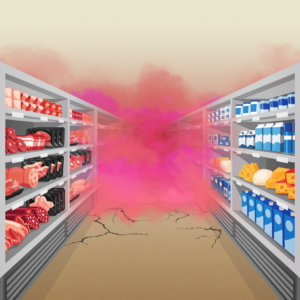
Growing the Good
Consumption of animal products such as meat and dairy has increased at an unprecedented pace since 1950s, with people in the Global North now consuming more than twice what is considered healthy. The number of animals grown for food currently stands at 30 billion, four times the number of humans on the planet, which is having significant negative environmental impacts. Animal agriculture is responsible for 16.5% of global greenhouse gas (GHG) emissions and 32% of all human-caused methane emissions.
Moreover, it requires huge amounts of natural resources, including 70-80% of all agricultural land devoted to growing animal feed and pasture, and around half of all water that is used for food production. Nevertheless, livestock production is forecast to grow further, particularly driven by population growth and the expansion of the middle-classes in emerging economies.
This campaign is focused on the need to rapidly cut methane emissions from livestock and transition to healthier diets with less and better meat and dairy.
Spotlight

Running Latte: Slow Progress on Methane in the Dairy and Coffee Industry
Reports

Running Latte: Slow Progress on Methane in the Dairy and Coffee Industry
An assessment of 20 of the world’s largest dairy and coffee companies, with combined revenues of over $420 billion, finds that most lack methane targets, credible action plans, or basic transparency around t...

“Clean Up on Aisle 3”: The methane mess supermarkets are hiding
New analysis finds twenty of the world's biggest food retailers fail to get to grips with massive methane emissions in their supply chains, despite meat and dairy making up an estimated one third of their to...

Dairytales: Arla’s smokescreen for its lack of climate action
As the world's fifth largest dairy producer, Arla has been selling a dairy fairytale of sustainability to continue to escape climate sanctions while prioritising false solutions that further industrialisatio...

Big Emissions, Empty Promises
Big Emissions, Empty Promises, exposes weak national policies and corporate commitments that fall short of effectively reducing methane emissions and achieving meaningful climate action in agriculture. Read ...

Big Meat and Dairy's Narratives To Derail Climate Action
Big Meat and Dairy companies are deploying ‘narratives’ in advertising, PR campaigns, and lobbying that paint the industry as greener than it really is and frame the stakes as too high to change. Like many p...

The New Merchants of Doubt: How Big Meat and Dairy Avoid Climate Action
This report reveals the tactics of Big Meat and Dairy companies to delay, distract, and derail action on transforming the food system, mirroring strategies used by the tobacco and fossil fuel industries.

Truth, Lies and Culture Wars - Social listening analysis of meat and dairy persuasion narratives
This study is a deep dive into information and misinformation on social media around production and consumption of animal products.

Seeing Stars: the new metric that could allow the meat and dairy industry to avoid climate action
Addressing methane emissions is essential to limiting the impacts of the climate crisis. However, the animal farming industry is promoting a new metric for measuring methane emissions, that could undermine t...

Net-zero integrity: Nestlé’s methane blindspot
In light of its huge contribution towards global warming, this briefing analyses Nestlé’s climate plan to reach net zero by 2050.

Feeding Us Greenwash: An analysis of misleading claims in the food sector
This report exposes the rampant greenwashing by the food industry and explores how consumers respond to green claims made by companies.

Hot Money: 40 Financial Institutions are funding a climate-changing agri-methane footprint
This report focuses on the 20 investors and 20 banks that are funding the methane generating activities of 15 of the leading meat and dairy companies worldwide. Collectively these financial institutions fu...

Emissions Impossible: How emissions from big meat and dairy are heating up the planet – Methane Edition
This joint report with the Institute for Agriculture and Trade Policy (IATP) for the first time estimates the methane emissions of five of the largest meat and ten of the largest dairy companies.

Methane Matters: Towards a global methane agreement
At the 2021 Climate Change Conference, over 110 countries joined a pledge to reduce global methane emissions by 30% by 2030. This crucial commitment under the ‘Global Methane Pledge’ came at a time of scient...

High Steaks: Taking methane from animal farming out of its blindspot
Methane emissions in the EU’s livestock sector are expected to drop by a mere 3.7% by 2030 with current policies, which means that the EU will not achieve its 30% commitments under the Global Methane Pledge.

Stranded in a vicious cycle? The case for transformation in animal agriculture
The production of meat and dairy is a significant source of carbon and methane emissions, but at the same time also uniquely dependant on stable climate conditions. In this briefing, we present a survey from...

Methane Matters: A comprehensive approach to methane mitigation
In November 2021, more than 110 countries committed to the ‘Global Methane Pledge’, with the collective goal of reducing global methane emissions by 30% by 2030. This report looks across the three main secto...

High Steaks: How focusing on agriculture can ensure the EU meets its methane-reduction goals
The EU is currently on track for around 17% methane reductions by 2030, which falls short to the 30% target it has committed to by signing the Global Methane Pledge. It is also significantly less than what t...

Blindspot: How lack of action on livestock methane undermines climate targets
The livestock agricultural sector is the single largest contributor to man-made methane emissions. Enteric fermentation in stomachs of ruminants, such as cows and goats, and manure management is responsible ...

Growing the Good: The Case For Low-Carbon Transition in the Food Sector
This report looked at the climate, environmental and health impacts of overconsumption of meat and animal products, current market trends and public policies in this area.
Latest Press Releases
Other Media & Publications

High Steaks
High Steaks is a campaign from the Changing Markets Foundation to urge the European Commission to act on methane emissions from agriculture.